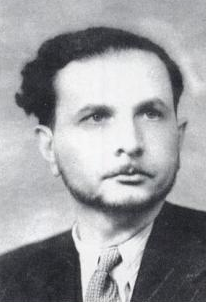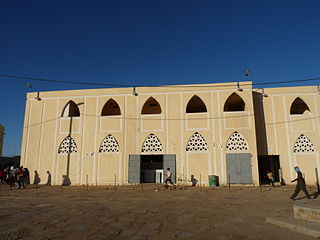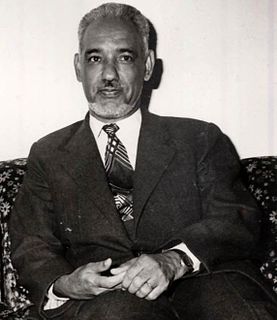
To assist in the decolonization process of the Spanish Sahara, a colony in North Africa, the United Nations General Assembly in 1975 dispatched a visiting mission to the territory and the surrounding countries, in accordance with its resolution 3292.
Mauritanian People's Party was the sole legal party of Mauritania from 1961 to 1978. It was headed by President Moktar Ould Daddah.
Opération Lamatin was a December 1977 – July 1978 military intervention by France on the behalf of the Mauritanian government, in its war against Sahrawi guerrilla fighters of the Polisario Front, seeking independence for Western Sahara. Airstrikes were launched in the provinces, but the results of the operation were not significant. France used Jaguar combat aircraft from Dakar Airbase. The bombings were targeted in the rail route from the iron mines in Zouérat to the coast of Nouadhibou, which were obstructed by Polisario.
Ahmed Ould Daddah is a Mauritanian economist, politician and civil servant. He is a half-brother of Moktar Ould Daddah, the first President of Mauritania, and belongs to the Marabout Ouled Birri tribe. He is currently the President of the Rally of Democratic Forces (RFD) and was designated as the official leader of the opposition following the 2007 presidential election, in which he placed second.
"Greater Mauritania" is a term for the Mauritanian irredentist claim to Western Sahara, and possibly other Moorish or Sahrawi-populated areas of the western Sahara desert.
This article is about the history of Mauritania from 1960 to 1978. Mauritania, officially the Islamic Republic of Mauritania, is an Arab Maghreb country in West Africa. It is bordered by the Atlantic Ocean in the west, by Western Sahara in the north, by Algeria in the northeast, by Mali in the east and southeast, and by Senegal in the southwest. It is named after the ancient Berber Kingdom of Mauretania, which later became a province of the Roman Empire, even though the modern Mauritania covers a territory far to the south of the old Berber kingdom that had no relation with it.

Parliamentary elections were held in Mauritania on 17 May 1959. The result was a victory for the Mauritanian Regroupment Party, which was the only party to contest the elections, thereby winning all 40 seats in the National Assembly. Voter turnout was 90.3%.

Presidential elections were held for the first time in Mauritania in August 1961 to elect the President for the next five years. Moktar Ould Daddah, who had been acting head of state since independence from France in 1960 was the only candidate, and was elected unopposed. Although he was a member of the ruling Mauritanian Regroupment Party, his candidacy was also supported by the Mauritanian National Union. Voter turnout was 93.6%.

Presidential elections were held in Mauritania on 7 August 1966. Following the merger of all the country's political parties into the Mauritanian People's Party (PPM), the country had become a one-party state in December 1961. Its leader, incumbent President Moktar Ould Daddah, was the only candidate, and was re-elected unopposed. Voter turnout was 96.2%.

General elections were held in Mauritania on 8 August 1976 to elect a President and National Assembly. At the time, the country was a one-party state with the Mauritanian People's Party (PPM) as the sole legal party. Its leader, incumbent President Moktar Ould Daddah, was the only candidate in the presidential election, and was re-elected unopposed, whilst the PPM won all the seats in the National Assembly election. Voter turnout was 97.9%. They were the last elections held until the restoration of multi-party democracy in 1992.
Mohamed Lemine Ch'bih Ould Cheikh Melainine is a Mauritanian politician. He has also served as the leader of the Qadiriyya Islamic brotherhood.

The Mauritanian Progressive Union was a political party in pre-independence Mauritania.
The Mauritanian National Union was a political party in Mauritania. The party was founded in April 1959, as a merger between a dissident group in the Mauritanian Regroupment Party (PRM) and the Union of Natives of Southern Mauritania (UOMS). The foundation of the party took place in the run-up to the May 1959 legislative elections. Members of the party bureau of UNM included Hadrami Ould Khatrri, Moussa Sall, Yacoub Ould Boumediana (chairman) and Ba Abdoul Aziz. The UNM favoured unity with the neighbouring states in the Mali Federation.
The Socialist Union of Mauritanian Muslims was a political party in Mauritania. The party was founded in February 1960. Achmed Ould Kerkoub was the leader of the party.
Aïssata Touré Kane is a former Mauritanian politician who was the country's first female government minister. After holding leadership positions in the youth wing and women's section of the Mauritanian People's Party, she served in the cabinet of President Moktar Ould Daddah from 1975 to 1978. Her time as a minister ended when Daddah's government was overthrown by a military coup.
Horma Ould Babana, also known as Ahmedou Bin Horma, Ahmedou Ould Horma Ould Babana and Horma Babana, was a Mauritanian politician who was active in the country's struggle against colonialism. Babana was the first Mauritanian deputy to the French National Assembly.







